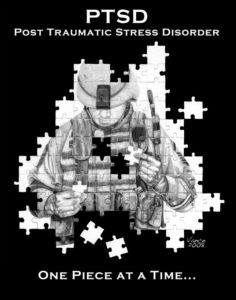
FALLS CHURCH, VA — Effective treatment of post-traumatic stress disorder is possible, but many Airmen falsely think seeking medical help for PTSD will hurt their career and will not help them get better.
These stigmas and misconceptions create perceived barriers, preventing Airmen from seeking care. Delaying treatment can cause the anxiety and fear following a traumatic event to affect an Airman’s readiness.
“If not properly addressed, PTSD decreases Airmen’s quality of life,” said Capt. Jordan Fields, an Air Force clinical psychologist at Joint Base San Antonio, Texas. “They can be less engaged, isolate themselves, and become more irritable and angry. It tends to have a negative impact on relationships, job performance, and mission readiness.”
Lt. Col. Joel Foster, the Air Force Mental Health Policy chief, says that many times Airmen delay seeking treatment for mental health problems because they have heard supposed stories of Airmen losing their jobs after going to the mental health clinic. Air Force mental health experts say these stories are largely myths, and that the vast majority of visits to the mental health clinic result in Airmen getting better.
“You can have one person in an entire squadron be discharged for mental health and word of that rare case spreads,” said Foster. “As a result, the rest of the squadron will have that fear despite the overwhelming fact that there is a relatively low risk that their PTSD diagnosis will negatively impact their career.”
As Foster explains, cases of Airmen losing careers from a PTSD diagnosis are extremely rare because current treatments have improved and access to mental health care has increased.
Some Airmen may put off seeking PTSD treatment because they do not know what the therapy entails.
“People are hesitant to try something when they do not know what to expect,” said Foster. “Many associate mental health with things they have seen on television, which is not always a positive image.”
Foster explained that negative media portrayals of mental health creates an image that PTSD is a chronic, lifelong disease that is difficult to treat. According to retired Lt. Col. Alan Peterson, consortium director, South Texas Research Organizational Network Guiding Studies on Trauma and Resilience in San Antonio, Texas, this is not the case.
“This could not be further from the truth,” said Peterson. “For active duty military who seek PTSD care, there is a very good chance that they can be treated within 10 sessions and be fully fit to support the mission.”
According to Foster, mental health providers depend on a set of standard treatment practices, built on years of research, proven to be effective, and vary little from therapist to therapist. Protocol-based therapies have clear objectives in place for each session. Prolonged exposure and cognitive behavior therapy are two of the most common therapies.
“For example, with prolonged exposure, we will safely work with the patient to slowly discuss those feelings and emotions surrounding the traumatic event until the fear and anxiety subsides,” said Foster. “Sessions are recorded for patients to review on their own. Often, they are given homework to help continue the therapeutic practices at home.”
PTSD treatments are highly effective. Foster cited research that shows more than 80 percent of patients respond favorably to protocol-based treatments.
“I have treated many PTSD patients who respond extremely well to protocol-based treatment,” said Foster. “After treatment many of them no longer meet the criteria to be diagnosed with PTSD. It is a total loss of diagnosis. This is great for the active duty population because it allows them to do their job.”
As Fields explains, treatment can be difficult, but worth it. Most patients are able to return to their jobs and lives, and function at a high level.
“We are still learning more about PTSD itself, but it is important to know that it is very treatable,” said Fields. “Every Airman needs to know that.”
Researchers continue to look at ways to improve PTSD treatment so that Airmen can get even better results. Peterson established a group of 150 investigators to focus on developing and evaluating protocol-based treatments for PTSD in active duty military.
“One study, called Project Remission, involves a three-week, full-time intensive treatment for PTSD,” said Peterson. “The goal is to provide the most intensive treatment that has ever been developed where patients can return to duty after three weeks of treatment.”
Project Remission accepts referrals for active duty military to participate in this intensive treatment program through Brook Army Medical Center and the University of Texas Health Science Center at San Antonio.
Those interested can visit www.strongstar.org/treatment for more information.


